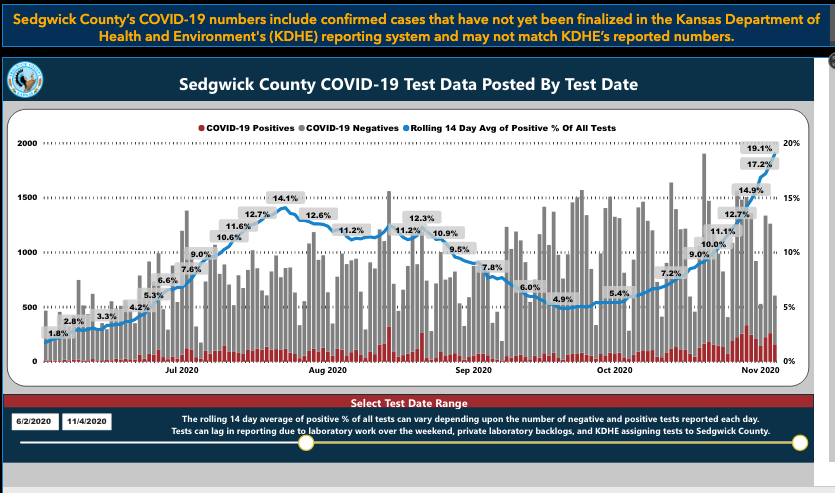
WICHITA, Kan. (AP) — The mayor of Kansas’ largest city is warning the public to take the coronavirus “seriously” as case numbers soar statewide and rural hospitals struggle to find larger facilities with room for their patients.
Wichita Mayor Brandon Whipple blamed a rise in cases on a “perfect storm” of people becoming fatigued over prevention measures, longing to see their families, and moving events indoors as the weather grows colder. In Sedgwick County, where Wichita is located, the number of confirmed and probable cases increased by 54% over the past month, jumping from 9,509 on Oct. 5 to 14,694 on Wednesday.

“We have to take COVID more seriously today than we did any other time this year because it’s more likely to catch COVID in Wichita and the surrounding areas than it’s ever been,” Whipple said in an interview published Thursday.
“We had a serious push for things to get back to normal with school, with sports, with work,” Whipple said. “When the numbers were lower, people let their guard down.”
The Wichita City Council allowed its mask law to expire last month, though Sedgwick County has a weaker mask order in place. The mayor said the council “sent a really bad message to the public” by dropping its ordinance as numbers were rising.
The Wichita area’s two major health systems said Wednesday that almost 150 coronavirus patients were hospitalized — their highest numbers since the pandemic began. Whipple said the city is not yet at the point where non-COVID patients are dying preventable deaths due to a lack of ICU beds and hospital staff, but “we’re getting close, if we don’t all start working together to take this thing seriously.”
Coronavirus numbers also were soaring statewide, according to data from the Kansas Department of Health and Environment. The state averaged 1,453 new cases a day for the seven days ending Wednesday — not a record, but still more than double the rolling seven-day averages reported a month ago.
Rural communities also were being hit hard, including Decatur County, where the number of cases increased to 152 on Wednesday, nearly double the 80 cases the county was reporting two weeks earlier. The spike was driven in part by an outbreak at the Good Samaritan Society-Decatur County, where 23 residents and 18 employees have tested positive. One resident has died.
The facility said in a statement that it is “using vigorous infection control measures” and working with state health officials.
Kris Mathews, the administrator of Decatur Health, a small critical access hospital, told The Associated Press it is getting hard to find beds in larger hospitals for “rapidly declining” patients because those larger hospitals are filling up. He said his hospital is generally staffed with two nurses, who struggle to handle seriously ill patients while also managing the emergency room and out-patient therapies such as IV infusions.
He said he knew it was bad when he “started seeing the line of cars about a week ago back up like a McDonald’s drive-thru” filled with people with possible COVID-19 symptoms such as a head ache, fever and sore throat who needed to be screened.
“It is a strain” he said. “It is a strain on us.”



